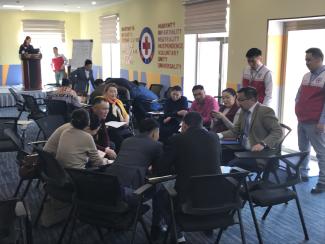The U.S. government, through the United States Agency for International Development (USAID), commenced a new two-year, $600,000 project to strengthen Mongolia’s capacity to prepare for natural hazards.
The “Sustainably Strengthening Local Disaster Capacity and Preparedness” project, implemented in partnership with the Mongolian Red Cross Society (MRCS), will help at-risk communities improve their resilience to natural hazards such as droughts, forest fires, and dzuds—harsh winter conditions that can lead to large-scale livestock deaths.
The project will train volunteers from ten Red Cross branches in disaster risk reduction, helping them establish disaster response teams, bolstering pre-positioned relief stocks, and training and equipping community fire-fighting teams. Through the partnership, MRCS will also train herder groups on disaster risk reduction and animal shelter repair to reduce the impact of dzuds. Finally, the project will share best business management practices, as well as facilitate a small grants program to assist herders in developing new ideas to diversify incomes.
Exacerbating the impact of disasters, climate change is impacting Mongolia at an alarming rate. In some areas, snow and permafrost have been melting with unprecedented speed, while in others, more severe winters have reduced rangeland vegetation, leaving less land for livestock to graze. A decline in forest cover has also increased the magnitude and severity of dust storms. This project will help Mongolia’s most at-risk communities be more resilient to these deteriorating conditions.
This project complements USAID’s ongoing “Disaster Resilient Communities” project led by World Vision, which is improving emergency response, first aid and disaster planning, as well as strengthening field veterinary services and animal disease prevention measures. Since 2010, USAID has provided approximately $6.7 million to support disaster risk reduction programs in Mongolia.

